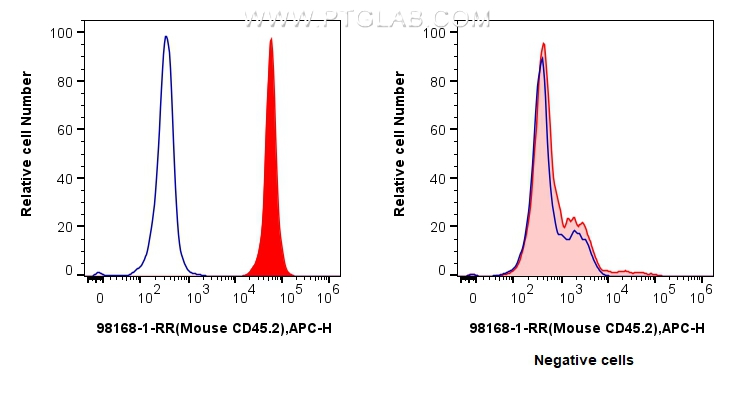Anti-Mouse CD45.2 Rabbit Recombinant Antibody
CD45.2 Uni-rAbTM Recombinant Antibody for FC
Host / Isotype
Rabbit / IgG
Reactivity
mouse
Applications
FC
Conjugate
Unconjugated
CloneNo.
240922E12
验证数据展示
经过测试的应用
| Positive FC detected in | C57BL/6 mouse splenocytes |
推荐稀释比
| Application | Dilution |
|---|---|
| This reagent has been tested for flow cytometric analysis. It is recommended that this reagent should be titrated in each testing system to obtain optimal results. | |
| Sample-dependent, Check data in validation data gallery. | |
产品信息
98168-1-RR targets CD45.2 in FC applications and shows reactivity with mouse samples.
| Tested Applications | FC Application Description |
| Tested Reactivity | mouse |
| Immunogen | Peptide 种属同源性预测 |
| Host / Isotype | Rabbit / IgG |
| Class | Recombinant |
| Type | Antibody |
| Full Name | protein tyrosine phosphatase, receptor type, C |
| Synonyms | Cd45, Ptprc, Leukocyte common antigen, LCA, B220 |
| Gene Symbol | CD45 |
| Gene ID (NCBI) | 19264 |
| Conjugate | Unconjugated |
| Form | Liquid |
| Purification Method | Protein A purfication |
| Storage Buffer | PBS with 0.09% sodium azide, pH 7.3. |
| Storage Conditions | Store at 2 - 8°C. Stable for one year after shipment. |
背景介绍
CD45, also known as protein tyrosine phosphatase, receptor type C, is a type I transmembrane protein expressed on the surface of all haematopoietic cells with the exception of erythrocytes and platelets (PMID: 3489673; 28615666). CD45 is a pan-haematopoietic cell marker and has been shown to be essential for T- and B-cell activation and signalling (PMID: 9429890; 16378097). Allelic variants of mouse CD45, CD45.1 (Ly5.1) and CD45.2 (Ly5.1), have been established as a marker system to track haematopoietic cells following congenic mouse bone marrow transplants (PMID: 28615666). CD45.2 is the common form and is expressed by most of the established strains, while CD45.1 is found in only a few like the SJL mouse strain (PMID: 3489673).
实验方案
| Product Specific Protocols | |
|---|---|
| FC protocol for CD45.2 antibody 98168-1-RR | Download protocol |
| Standard Protocols | |
|---|---|
| Click here to view our Standard Protocols |

